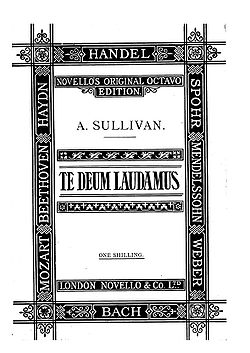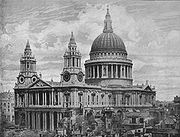
Te Deum Laudamus (Sullivan)
Encyclopedia

- For Sullivan's earlier Te Deum, see Festival Te DeumFestival Te DeumThe Festival Te Deum is the popular name for an 1872 composition by Arthur Sullivan, written to celebrate the recovery of Albert Edward, Prince of Wales from typhoid fever...
.
Arthur Sullivan
Arthur Sullivan
Sir Arthur Seymour Sullivan MVO was an English composer of Irish and Italian ancestry. He is best known for his series of 14 operatic collaborations with the dramatist W. S. Gilbert, including such enduring works as H.M.S. Pinafore, The Pirates of Penzance and The Mikado...
's Te Deum Laudamus—A Thanksgiving for Victory, usually known as the Boer War Te Deum, is a choral work composed by Sullivan in the last few months of his life. It was commissioned on behalf of Dean and Chapter of London's St. Paul's Cathedral by the cathedral's organist, Sir George Martin, as part of a grand service to celebrate the expected British
Great Britain
Great Britain or Britain is an island situated to the northwest of Continental Europe. It is the ninth largest island in the world, and the largest European island, as well as the largest of the British Isles...
victory in the Boer War
Boer War
The Boer Wars were two wars fought between the British Empire and the two independent Boer republics, the Oranje Vrijstaat and the Republiek van Transvaal ....
.
The Boer War Te Deum was first performed at St. Paul's Cathedral on June 8, 1902, eight days after the official ending of the war, and 18 months after the deaths of both Sullivan and Queen Victoria. The piece was composed for chorus, brass, strings and organ, and features as a recurring theme the melody of Sullivan's hymn tune
Hymn tune
A hymn tune is the melody of a musical composition to which a hymn text is sung. Musically speaking, a hymn is generally understood to have four-part harmony, a fast harmonic rhythm , and no refrain or chorus....
"St. Gertrude", his setting for "Onward Christian Soldiers."
Background
Arthur Sullivan became Britain's most famous composer during the late Victorian eraVictorian era
The Victorian era of British history was the period of Queen Victoria's reign from 20 June 1837 until her death on 22 January 1901. It was a long period of peace, prosperity, refined sensibilities and national self-confidence...
, and so he was an obvious choice to compose a piece to celebrate the coming end of the Boer War. George Martin and Colonel Arthur Collins visited Sullivan in his home on May 26, 1900 to ask him to write the Te Deum. Sullivan wrote in his diary that he consented to try and see what he could do.
Sullivan encountered some delays in the course of composing the Te Deum, including a difficult trip to Germany in June 1900. Despite Sullivan's fame and popularity in Germany, the country's attitude toward the Boer War dampened Sullivan's reception. In addition, Sullivan had already committed to working on the comic opera
Comic opera
Comic opera denotes a sung dramatic work of a light or comic nature, usually with a happy ending.Forms of comic opera first developed in late 17th-century Italy. By the 1730s, a new operatic genre, opera buffa, emerged as an alternative to opera seria...
The Emerald Isle
The Emerald Isle
The Emerald Isle; or, The Caves of Carrig-Cleena, is a two-act comic opera, with music by Arthur Sullivan and Edward German, and a libretto by Basil Hood. It premiered at the Savoy Theatre on 27 April 1901, closing on 9 November 1901 after a run of 205 performances...
for the Savoy Theatre
Savoy Theatre
The Savoy Theatre is a West End theatre located in the Strand in the City of Westminster, London, England. The theatre opened on 10 October 1881 and was built by Richard D'Oyly Carte on the site of the old Savoy Palace as a showcase for the popular series of comic operas of Gilbert and Sullivan,...
and was forced to put it aside to work on the Te Deum. Sullivan noted in his diary in July 1900 that he was essentially finished with the Te Deum. Soon afterwards, he grew ill, and in October he gave Martin final instructions about staging the work. Sullivan died in November, before he could complete The Emerald Isle, leaving that opera to be finished by his friend Edward German
Edward German
Sir Edward German was an English musician and composer of Welsh descent, best remembered for his extensive output of incidental music for the stage and as a successor to Arthur Sullivan in the field of English comic opera.As a youth, German played the violin and led the town orchestra, also...
.
The Te Deum premiered as part of a larger service celebrating the end of the Boer War. King Edward and other members of the Royal family were in attendance. The King and Queen entered the Cathedral to Sullivan's hymn Onward Christian Soldiers.
Analysis and criticism

Book of Common Prayer
The Book of Common Prayer is the short title of a number of related prayer books used in the Anglican Communion, as well as by the Continuing Anglican, "Anglican realignment" and other Anglican churches. The original book, published in 1549 , in the reign of Edward VI, was a product of the English...
, showing Sullivan's "personal Christian commitment" at the end of his life. In addition, his use of his popular hymn tune, "St. Gertrude," throughout the Te Deum is the most prominent self-reference that Sullivan allowed himself in his career, underlining the very personal nature of this final work and his love of his church and country. Benedict Taylor wrote that unlike Sullivan's earlier Festival Te Deum
Festival Te Deum
The Festival Te Deum is the popular name for an 1872 composition by Arthur Sullivan, written to celebrate the recovery of Albert Edward, Prince of Wales from typhoid fever...
,
the work is relatively subdued, more self-effacing, concise and emotionally subtly-tinged.... A compact, single movement work of about a quarter-of-an-hour's duration... [its] musical sections corresponding to the traditional divisions of the liturgical text run into one another without break. A degree of unity across the sectional, evolving structure is provided by cyclic features... and the use of common or related material for successive sections.... Of possibly even greater structural cohesion is the pervasiveness of march-like figures throughout the work, principally rhythmic but often also employing repeated notes or arpeggiac figures characteristic of the hymn tune 'St Gertrude'.... It is a work whose grandeur and restrained dignity have made it cherished and esteemed....
Contemporary critics also reviewed the piece favourably. The Daily Telegraph wrote, "Then the Service reached its central episode with the Te Deum sung to Sir Arthur Sullivan’s music, deprived, through the absence of strings, of its full orchestral beauty, but wrought up from exquisite tenderness to a pitch of dignity and strength." Note the reference in the previous quote to the absence of strings: The cathedral was unable to procure a suitable string section, and so the Te Deum was premiered without strings. The Musical Times was also favourably impressed by the piece:
In every page of the score we can trace the hand of the skilled musician, once a Chorister of the Chapel Royal. Moreover the work is impregnated with a robustness distinctly national in the directness of its diatonic expression. The introduction of the composer's familiar hymn tune 'Onward Christian Soldiers' — first in fragments and afterwards in its entirety — infuses a military element into this Thanksgiving Te Deum, the significance of which is obvious.
Recordings
The entire work appears on That Glorious Song of Old (1992), conducted by Paul Trepte, but without a full orchestra.A complete recording with full orchestra appears on The Masque at Kenilworth — Music for Royal and National Occasions (1999), conducted by Michael Smedley.
A complete recording was released on CD in 2003 by Hyperion, paired with Sullivan's cantata
Cantata
A cantata is a vocal composition with an instrumental accompaniment, typically in several movements, often involving a choir....
The Prodigal Son
The Prodigal Son (Sullivan)
The Prodigal Son is an oratorio by Arthur Sullivan with text taken from the parable of the same name in the Gospel of Luke. It features chorus with Soprano, Contralto, Tenor and Bass solos...
. The recording features the New London Orchestra and the London Chorus, conducted by Ronald Corp.
Text
The text of the Boer War Te Deum is as follows:
We praise Thee, O God: we acknowledge Thee to be the Lord.
All the earth doth worship Thee: the Father everlasting.
To Thee all Angels cry aloud: the Heavens, and all the Powers therein.
To Thee Cherubin, and Seraphin: continually do cry,
Holy, Holy, Holy: Lord God of Sabaoth;
Heaven and earth are full of the Majesty: of Thy Glory.
The glorious company of the Apostles praise Thee.
The noble army of Martyrs: praise Thee.
The holy Church throughout all the world: doth acknowledge Thee;
The Father: of an infinite Majesty;
Thine honourable, true: and only Son.
Also the Holy Ghost: the Comforter.
Thou art the King of Glory: O Christ.
Thou art the everlasting Son: of the Father.
When Thou tookest upon Thee to deliver man: Thou didst not abhor the Virgin's womb.
When Thou hadst overcome the sharpness of death: Thou didst open the Kingdom of Heaven to all believers.
Thou sittest at the right hand of God: in the Glory of the Father.
We believe that Thou shalt come: to be our Judge.
We therefore pray Thee, help Thy servants: whom Thou hast redeemed with Thy precious blood.
Make them to be numbered with Thy Saints: in glory everlasting.
O Lord, save Thy people: and bless Thine heritage.
Govern them: and lift them up for ever.
Day by day: we magnify Thee;
And we worship Thy Name: ever world without end.
Vouchsafe, O Lord: to keep us this day without sin.
O Lord, have mercy upon us: have mercy upon us.
O Lord, let Thy mercy lighten upon us: as our trust is in Thee.
O Lord, in Thee have I trusted: let me never be confounded.
External links
- Introduction to the piece at The Gilbert and Sullivan Archive
- Review in The Times, 9 June 1902
- The New York Times account of the Thanksgiving service that featured the Te Deum.
- Facsimile full score with an illustrated background essay from the Sir Arthur Sullivan Society

